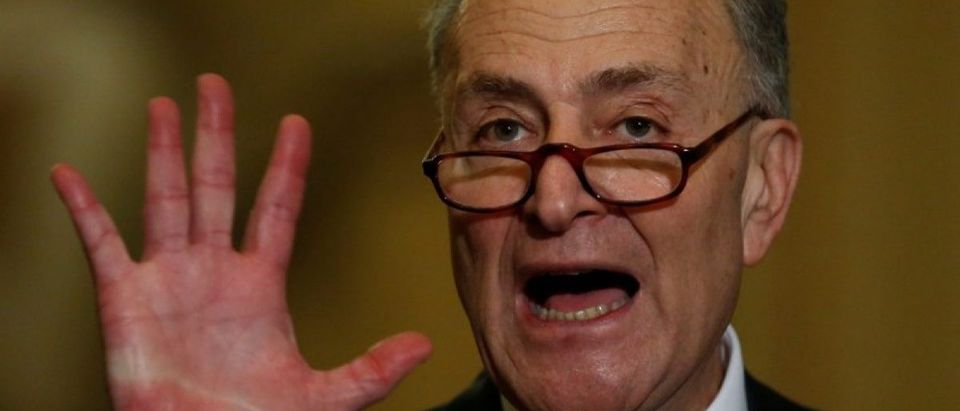Now three weeks into President Trump’s administration, Congress has confirmed nine members of the President’s cabinet and less than two percent of the nearly 700 key positions requiring Senate confirmation – putting the cabinet several positions behind after Barack Obama’s first week on the job back in 2009. Outraged over the fact that Mitch McConnell didn’t grant Obama a Supreme Court seat last year, Senate Democrats have now decided to “slow walk” seemingly any and every nominee they can—regardless of the individual’s qualifications and the effect it will have on the country.
On Tuesday, the war of attrition over staffing the federal government reached its most unprecedented proportions yet. To bring the bitter fight over making Betsy DeVos Secretary of Education to an end, Vice President Mike Pence had to step in and cast the first tie-breaking vote to confirm a cabinet secretary in our nation’s history. In fact, with the exceptions of Trump’s favorite Marines – Secretary of Defense James Mattis and Secretary of Homeland Security John Kelly – the rest of President Trump’s cabinet picks have been slammed by left-wing outlets and grilled by Democratic lawmakers, at least when those lawmakers have been willing to attend the proceedings.
The irony here is that, as Democratic leaders will readily admit to themselves, the party’s entire ethos is centered around the government functioning effectively. Under fire from a militant progressive movement and struggling to make themselves heard with what little power the American electorate has left them, the leadership has had to resort to theatrics, like committee hearing walkouts, and petty snubs to convince the base that they are taking a stand. By the standards of the august Senate, Schumer’s vote against Elaine Chao (McConnell’s wife) for Secretary of Transportation registers as scandalous.
These heroic last stands might be succeeding in sating the raw anger of the Democratic base, but they are also betraying the fundamental contract between the government and the voters by denying the American people a working government. While the vast majority of the news media hangs on President Trump’s every tweet and taps into the White House rumor mill, the real cost of obstructionism on Capitol Hill is making itself felt. There are 1.4 million federal employees but hardly anyone in place to monitor their work or implement a coherent policy agenda. All this begs the question: what is happening at these agencies that are working either undermanaged or entirely unsupervised?
The troubling answer is that nobody really knows. Government programs without direct oversight from the White House are currently muddling by as best they can, with political leadership now absent since President Obama’s departure. Programs that provide critical services to millions of American citizens at agencies including Veterans Affairs, Housing and Urban Development, and Health and Human Services have been forced to make do without confirmed leadership. As a result, they remain either stalled while awaiting direction or stumbling ahead despite conflicts with the elected president’s agenda.
The VA, for one, already has a difficult time providing veterans with the care they earned in service to this country. How does delaying David Shulkin, an Obama appointee with a proven track record and President Trump’s nominee to head the VA, make things any better? Similarly, how have mission-critical medical research programs and grant decisions been made at the NIH without the direction of the just-confirmed HHS Secretary? Despite their grandstanding, Democrats never had the votes to stop Rep. Tom Price’s nomination to head the department—and they knew it. At best, choosing these nomination battles as hills to die on accomplishes little more than throwing vital government programs into limbo for a few weeks longer than necessary.
Of all the confirmation battles yet to come, perhaps none will be more illustrative of out-of-control partisanship than the Senate’s deliberations over Neil Gorsuch. Gorsuch is, by any measure, a thoroughly competent and qualified Supreme Court nominee who would sail through the confirmation process under anything approaching normal circumstances. A former Harvard Law classmate of Barack Obama and a veteran appeals court judge, Gorsuch has been endorsed by none other than Obama ethics czar Norm Eisen as a thoughtful and deliberate legal mind. In this poisonous political climate, however, the evenhanded judge is being portrayed as an “extreme conservative” by critics both within and outside the Senate—seemingly because it was Donald Trump that made the pick.
These invectives against even the least controversial of nominees reveal that the Democratic establishment has still failed to learn a key lesson of its 2016 defeat. When you portray all of your opponents as reactionary zealots, it eventually becomes impossible to tell who holds views which are truly beyond the pale from those who simply disagree with you. The cries of wolf are, after much repetition, falling on deaf ears.
By engaging in tactics to halt his Cabinet from being assembled, the same lawmakers and protesters who criticize the President for ruling by executive order are inadvertently (or perhaps intentionally) forcing his administration to try and run the country without any political leadership, empowering the bureaucracy that no one elected. While the President draws his fair share of criticism, he also deserves the chance to govern that our Constitution dictates and as Hillary Clinton herself said in her concession speech in November. Regardless of the partisan decide, the American public wants its governments to be successful for the good of the country. So long as Congress denies the administration a coherent staff, President Trump will be fighting unnecessary hurdles in trying to achieve that shared goal.


